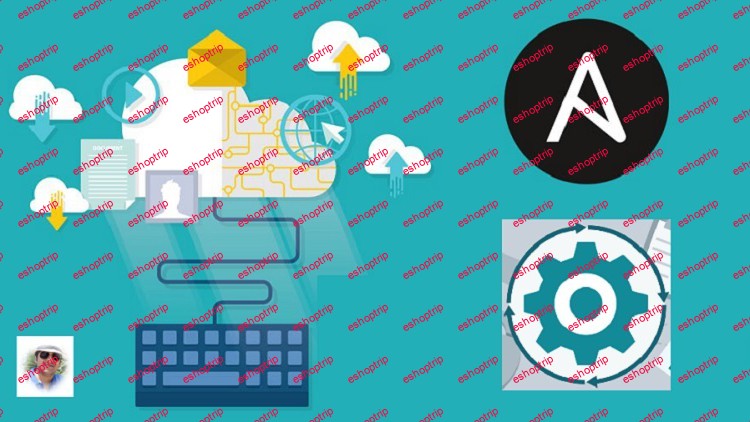Last updated 1/2024
Duration: 9h11m | Video: .MP4, 1920×1080 30 fps | Audio: AAC, 44.1 kHz, 2ch | Size: 3.38 GB
Genre: eLearning | Language: English
This course introduces Ansible to the absolute beginners & System Admins to enhance skills towards Ansible.
What you’ll learn
Introducing Ansible-Overview of Ansible Architecture
Implementation of Ansible Playbooks
Automate Linux Patching using Ansible
Project Labs to gain a better understanding of using Ansible Playbooks for patching Linux servers
Managing Variables & Inclusions
Various labs on implementing playbooks from a real IT industry environment
Gain sufficient skills to perform core system administration Automation
Implementing Tasks Controls
Overview of Ansible Installation
Online/Offline Ansible installation
Ansible Conditionals
Ansible Modules
Industrial Live overview of Automation tool using Ansible with Shell Scripting
Ansible Handlers
Ansible Loops
Deploying Ansible
Writing YAML Files
Ansible Roles
How do we create Ansible Roles?
Industrial project of stop/start control m appl/db
Requirements
PC or Laptop with internet Connection
There is no formal prerequisites for this course; however, previous system administrator experience on other operating system would be very beneficial.
Description
Mastering Ansible Step by Step
Course Contents
1 Introducing Ansible
Overview of Ansible Architecture
Ansible Components
Overview of Ansible Deployments
Describing Ansible Inventory
Summary
2 Deploying Ansible
Installing Ansible
Guided Exercise: Installing Ansible
Managing Ansible Configuration Files
Guided Exercise: Managing Ansible Configuration Files
Running Ad Hoc Commands
Guided Exercise: Running Ad Hoc Commands
Managing Dynamic Inventory
Guided Exercise: Managing Dynamic Inventory
Lab: Deploying Ansible
Summary
3 Ansible Installation on Red Hat Linux 8
Overview of Ansible Installation
Online Ansible Installation
User’s Account Setup for Passwordless Authentication
Offline Ansible Installation ( When there is no internet available on Control Node )
4 Implementing Playbooks
Writing YAML Files
Guided Exercise: Writing YAML Files
Implementing Modules
Guided Exercise: Implementing Modules
Implementing Ansible Playbooks
Guided Exercise: Implementing Ansible Playbooks
Lab: Implementing Playbooks
Summary
5 Managing Variables and Inclusions
Managing Variables
Guided Exercise: Managing Variables
Managing Facts
Guided Exercise: Managing Facts
Managing Inclusions
Guided Exercise: Managing Inclusions
Lab: Managing Variables and Inclusions
6 Implementing Task Control
Constructing Flow Control
Guided Exercise: Constructing Flow Control
Implementing Handlers
Guided Exercise: Implementing Handlers
Implementing Tags
Guided Exercise: Implementing Tags
Handling Errors
Guided Exercise: Handling Errors
Lab: Implementing Task Control
Summary
7. Ansible Roles
About Ansible Roles
How do we create Ansible Roles
Lab Session to create roles
8. Industrial project to Automate Patching on Multiple Linux Server using Ansible Playbook
Overview about Linux Patching
Automate Linux Patching using Ansible
Verify application/Database processes are running or not
Decision point to start patching
Upgrade all the packages on the server
Check if reboot required after the kernel update
Install the specific kernel version using Ansible Playbook.
Various Labs to understand the Ansible Playbook for patching
9. Industrial project for Stop/Start Control M appl/db
Overview of project
Designing of Ansible playbooks
Lab Sessions
10. Create Automation tool using Ansible & Shell
Overview of Automation Tool
Concept of Automation Tool
Communication between Ansible Server with managed hosts
Front look of Automation Tool
What we are achieving from this Automation tool.
Pre-validation Configuration (To capture pre-change configuration details)
User Administration
1. User Creation
2. User Removal
3. Group Add
4. Password Reset
Run Ad Hoc Command
Health Check Statistics
1. Memory Utilization
2. CPU Utilization
3. Overall I/O Activities
4. Reports run queue and load average
5. Top Memory Consuming processes
6. Top CPU Consuming Processes
7. Shared Memory
Design of Automation Tool
Design Front Look using case statement
Practice Lab Session on case Statement -1
Practice Lab Session on case Statement -2
Color Fonts in desinging the tool
Headline & Selecting the target servers
Lab sessions
Shell Scripting
1. If..else..elif statement
2. Loops
3. Sed – Stream Editot
4. Awk
The case esac statement
Last lecture
Who this course is for
IT professionals across a broad range of disciplines who need to perform essential administration tasks and automation.
Graduate Students and also for those who are looking for a job in Automation using Ansible (RedHat Linux) & wants to get hands-on practical experience on Automation & build up a base on Ansible.
Homepage
https://www.udemy.com/course/automation-with-ansible/










